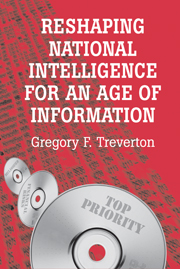Book contents
- Frontmatter
- Contents
- Foreword
- Preface
- Note on sources
- 1 The imperative of reshaping
- 2 The world of intelligence beyond 2010
- 3 The militarization of intelligence
- 4 Designated readers: the open source revolution
- 5 Spying, looking, and catching criminals
- 6 The intelligence of policy
- 7 A reshaped intelligence
- Index
Foreword
Published online by Cambridge University Press: 23 May 2010
- Frontmatter
- Contents
- Foreword
- Preface
- Note on sources
- 1 The imperative of reshaping
- 2 The world of intelligence beyond 2010
- 3 The militarization of intelligence
- 4 Designated readers: the open source revolution
- 5 Spying, looking, and catching criminals
- 6 The intelligence of policy
- 7 A reshaped intelligence
- Index
Summary
This book is a happy collaboration between RAND and the Twentieth Century Fund, now The Century Foundation. In fact, it became a tripartite collaboration, including Cambridge University Press, with which RAND inaugurated a new book series of policy analyses, a series edited by Charles Wolf, Jr., just as Greg Treverton joined RAND. Greg had left the vice chair of the National Intelligence Council during the Clinton administration to come to RAND to run the International Security and Defense Policy Center. At the same time, he joined a Twentieth Century Fund task force on intelligence that produced a report several years ago, In From the Cold. Greg contributed a background paper to that report, a paper that began to develop the issues treated in this book, and he played a major role in pushing the report to conclusion.
Our premise in this collaboration is the same as Greg's: Not only has the world of American intelligence been upended by the end of the Cold War, but the necessary reshaping of intelligence will itself have to result from a more open discussion of it than has been the norm in the American democracy. RAND and The Century Foundation share an interest in that reshaping of intelligence as an important part of America's capacity in foreign affairs. For RAND, U.S. intelligence is a client and an increasingly important one. As intelligence strives to adapt to a changed world, a range of RAND capacities — from regional analysis, to budgeting and manpower planning, to thinking about costly systems against an uncertain future — is more and more relevant.
- Type
- Chapter
- Information
- Reshaping National Intelligence for an Age of Information , pp. xi - xiiPublisher: Cambridge University PressPrint publication year: 2001

